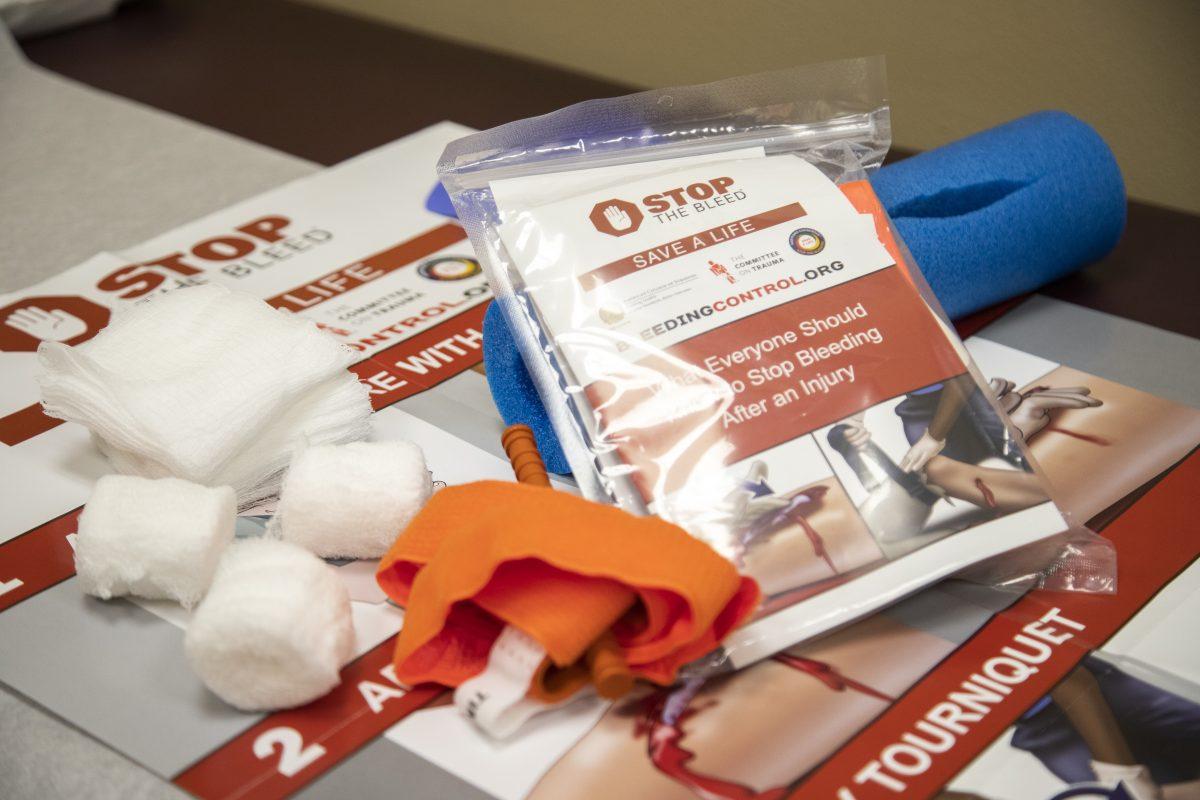Eileen Bevilacqua, R.N. director of the Student Health Center, wants as many people as possible on campus to be prepared in the event of a life-threatening bleeding emergency, like a mass shooting.
Bevilacqua attended a conference several months ago where she learned about the Stop the Bleed campaign, a national awareness campaign implemented in October 2015 under the Obama administration. Its purpose is to train bystanders to assist in bleeding emergencies, helping them become the “beginning of the trauma care chain of survival,” according to BleedingControl.org, a website sponsored by the American College of Surgeons.
“They were talking about, for active shooters, sometimes 10, 20, 50 people are shot, and then they call 911,” Bevilacqua recounted. “How long is it going to take for an ambulance to get there and how you can bleed out in two minutes and die. There are all these bystanders that are there that don’t know that to do to help somebody until EMS can get there.”
For Bevilacqua, Stop the Bleed training could help save lives, and she is looking tooffer that training to anyone at St. Joe’s who is interested.
“I can teach everybody what to do in the event of a shooter, after it’s safe,” Bevilacqua said, “what to do in the event of a mass shooting, how to stop the bleed, how to treat somebody who has a gunshot wound while waiting for the medics to get there.”
So far, Bevilacqua’s budget has allowed her to purchase two of the cheapest emergency kits available at $69 each. Some kits cost over $600.
“The personal control kit has in it a tourniquet, gloves, quickclot—which is something you can put into a bleeding wound and it clots it—and some dressings,” Bevilacqua explained. “It also has a marker on there because if you put a tourniquet on somebody’s arm or leg you need to document what time the tourniquet was applied.”
Bevilacqua’s goal is to purchase additional kits to put next to the 20 automated external defibrillators (AEDs), medical devices used in cardiac emergencies, that are already located on campus.
Free Stop the Bleed trainings are offered all over the country, including in the Philadelphia area. Einstein Healthcare Network has a Stop the Bleed program as does Main Line Health. Penn Medicine is also part of the campaign, hosting its first event for 250 school nurses in 2016 at Lincoln Financial Field.
John Gallagher R.N., trauma program manager for Penn Medicine’s division of traumatology, surgical critical care and emergency surgery, said the training makes sense for large spaces like universities, and it is crucial for organizations to “invest in the right type of equipment.”
“It is important to have this equipment available and the training available so that any bystander that might happen to be there can jump into action,” Gallagher said. “We often think of these events with terrorist activities or car accidents, but they can be very simple things. We have had people on our own campuses that have cut their hands on bottles or glasses or using tools and just ending up with a bleeding wound that requires more than a bandaid, that requires pressure, maybe packing, maybe a tourniquet.”
Nene Okunna, Ph.D., assistant professor of interdisciplinary health services, noted that the Stop the Bleed Campaign is “gaining traction nationwide,” including at universities. She said it is a good idea for people to know how to assist in bleeding emergencies but any training should include basic first aid as well as how to perform CPR.
“A similar campaign on SJU would create the awareness of uncontrolled bleeding and teach students the skills to assist anyone in need,” Okunna said in an email to The Hawk. “However, I would recommend that this program be comprehensive, teaching first aid skills rather than focus solely on stopping traumatic bleeding.”
Sally Kuykendall, Ph.D., professor of interdisciplinary health services, said she has reservations about the Stop the Bleed Campaign.
“I believe that the Stop the Bleed campaign organizers are capitalizing on public fear and may inadvertently normalize school attacks,” said Kuykendall in an email to The Hawk. “I apologize to your generation and young people across the nation that we prioritize gun ownership over your physical and emotional safety in school and community.”
Kuykendall said from a public health perspective, prevention is a better way to address “man-made disasters” like mass shootings.
“This can be achieved by reaching out to individuals who are struggling or isolated, providing quality mental health services, creating safe spaces for all students (inclusion), reducing day to day aggression (be kind) and modeling of cura personalis and social justice by faculty, staff and administrators,” Kuykendall said.
Kuykendall said she recommends Red Cross training instead, which covers multiple types of injuries.
Last week at St. Joe’s, Bevilacqua held a class for about 25 pre-med, pre-dental and interdisciplinary health services majors in the Alpha Epsilon Delta Honor Society. Bevilacqua said she would like to hold more classes like that one.
“This is such an important topic that I am going to pursue giving talks, teaching anybody that wants to [know] how to treat somebody that’s a victim of a mass shooting,” Bevilacqua said. “The more people that know, the higher the chance of survival. This is something that I just believe strongly in, so I am happy to promote this to whomever would like to learn.”









































Karissa • Oct 9, 2019 at 12:09 am
This article is well written and informed. Great read! Raises awareness to something so timely.
Take the time to read this everyone!!!